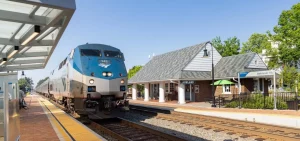News
Ohio takes the first step to get feds on board with expanding passenger rail here
By: Karen Kasler | Statehouse News Bureau
Posted on:
COLUMBUS, Ohio (Statehouse News Bureau) — Advocates for high speed trains are celebrating that the state will apply for federal funds to pay for a study on the feasibility of passenger rail service in Ohio. They’re hoping Ohio can benefit from the $2.3 billion in grant for passenger rail in the 2021 federal infrastructure law, the largest investment in passenger rail Amtrak’s history.

But William Murdock with the Mid-Ohio Regional Planning Commission said it’s an exciting first step, though they’ll have to wait till next year to find out if the funds are approved.
Murdock said the 3C + D plan “looks compelling. We have an application process that the governor and our partners up and down the line are going to move forward. And at the end of that study is potentially the best chance we’ll ever have at funding to move forward.”
Murdock says a study would update previous studies done before a passenger rail plan was rejected in 2010, and would show what track improvements need to be done and how much they’ll cost, along with estimates of passenger demand. Murdock notes there’s also a plan to connect Chicago to Pittsburgh through Columbus.
“What the FRA process that we’re entering into will actually allow us to dive deep into those capital improvements, those rail upgrades, those crossing upgrades that we need to make not just for passenger rail, but to improve that whole service between those cities,” Murdock said.
Murdock said the Federal Railroad Administration’s study would look at whether existing tracks in Ohio could support both freight and passenger trains. And he said the study will be different than analyses done before a previous passenger rail plan was rejected a dozen years ago, in large part because the corridor’s population has grown since 2010.
That year, Democratic Gov. Ted Strickland and state officials got $400 million in federal stimulus money to build a passenger rail line from Cleveland to Columbus to Cincinnati. In that debate, ODOT had said that Ohio would need to add new tracks to support high speed trains traveling at 110 miles an hour. initial estimates were that the train would average 39 miles an hour, though ODOT later updated that to 50 miles an hour.
The funds were eventually returned to the feds as incoming Republican Gov. John Kasich rejected the passenger train plan after he defeated Strickland.
The cost to build the line in 2010 was estimated at $564 million. But last May Amtrak estimated the cost at $100 million. If approved, the federal government would pay to keep the line running for the first three years with a phased-in handoff of operations to the state. The last project estimated $17 million a year from the state for operations.
Travel time has also been a concern. In 2010, it was estimated a trip from Cleveland to Cincinnati would take six and a half hours, in contrast to around four hours by car. Last year, Amtrak spokesman Mark Maglieri said in an interview for “The State of Ohio”: “We estimated a travel time of about five and a half hours.”
But Murdock said he’s optimistic: “This is a time where if it’s going to happen, this is the time that it’s going to happen.”

